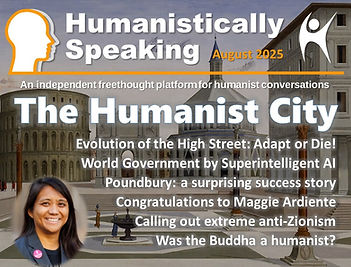Humanism is a non-religious and values-based worldview. Humanists aim to promote reason and science, free thought and free speech, tolerance and understanding, kindness and compassion. Humanistically Speaking, launched in the UK in 2020, is an online magazine for humanists, atheists, rationalists, agnostics, sceptics, and everyone who wants to make the world a better place through human effort and endeavour. We are an independent regular publication but we see ourselves as very much part of the global humanist community. In January 2023, we said a fond farewell to our PDF format and went fully digital. You can now comment on our articles - just sign up using the 'log in' tab top right. Thanks for visiting!

This Quarter's Issue
Last Quarter's Issue
Welcome to the Autumn 2025 Edition of Humanistically Speaking. Our main theme for this issue is radicalisation. ‘Radical’ is a word with an honourable past. It comes from the Latin radix meaning root. To think radically is to go deep, to examine assumptions, to challenge inherited thinking. Humanism has always been radical in this sense. But ‘radicalisation’ has come to mean something much more troubling. It signals a slide into ideological certainty – an attitude not of inquiry but of crusade. Anthony Lewis, Maggie Hall, Sophy Robinson and I tackle the subject from a range of different angles.
My article on anti-Zionism in our last issue generated a lot of debate on Facebook and elsewhere. John Baxter has contributed a critical response in this month’s issue, and I have replied with some further reflections. Point one of President Trump's 20-point peace plan stipulates that Gaza will be de-radicalised and that it will be redeveloped for the benefit of the people of Gaza, who have suffered more than enough. We will have to wait and see how this plays out in the months and years ahead.
We're delighted to have three writers from North America this issue: Lloyd Hawkeye Robertson writes about Antisemitism and the Left, David Falls reconsiders the ethics of Jesus and the evolutionary advantage of doubt, and Tod Lundy tells the story of how his 50-year career in architecture started with a two-second conversation. Elsewhere, Mike Flood explores AI and the meaning of humanity, David Mayston reclaims spiritual language for humanists, David McKnight invites us to think like scientists, and Peter Connolly takes a deep dive into John Stuart Mill's seminal text On Liberty.
Finally, meet Alexandr Ivanovich – the philosopher-chef at Café Sapiens – who shares his secret recipe for perfect borscht – a soup for all humanists!
We hope you will share our articles on social media. You’re free to republish them in your own humanist newsletters and elsewhere, as long as you credit the author and provide a link to Humanistically Speaking. For more details, refer to our Creative Commons licence by following the links at the bottom of every page.
Humanistically Speaking is now a quarterly journal. If you’d like to contribute an article or news report for our Winter issue to be published on 1st February 2026, do get in touch. And thank you for all you do to make humanism a recognized framework of meaning and morality in our tragic yet hopeful world.
David Warden
Editor

We have a wide mix of writers - please contact the Editor if you want to write an article for us



